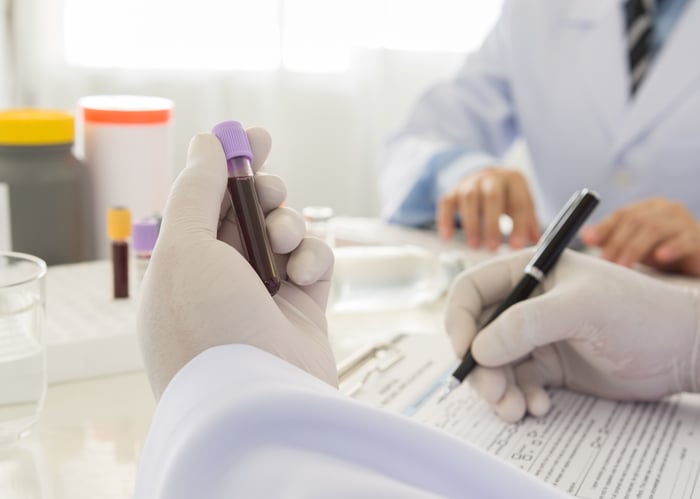Over the past couple of months, investors have been taken on the wildest roller-coaster ride in the stock market's history. The coronavirus disease 2019 (COVID-19) pandemic has created uncertainty and labor market disruption on a scale that's never been seen in the modern era. As a result, the benchmark S&P 500 lost as much as 34% of its value in a stretch of just 33 calendar days.
But if we've learned anything as investors, it's that there's often opportunity to be had amid panic selling. Even though the stock market has rebounded substantially from its March 23 lows, many great companies are still well off their highs, and therefore could be ripe for the picking. But if I had to choose just one company as my single best investment idea for June, it would be biotech stock Intercept Pharmaceuticals (ICPT).

Image source: Getty Images.
Even great companies have risks -- here are Intercept's
Before I dig into the many reasons I believe Intercept is a stock you're going to want to own moving forward, I'd be remiss if I didn't first hit on the reasons why its share price has been under pressure in recent weeks (and years).
The company's initial troubles date back to 2017, when the safety of its lead drug, Ocaliva, came under fire as a treatment for patients with primary biliary cholangitis (PBC). PBC is a progressive and fatal liver disease that may result in a little over $300 million in annual sales at its peak for the company.
In September 2017, it was disclosed by Intercept, and days later by the Food and Drug Administration (FDA), that some PBC patients (19, according to the FDA) taking Ocaliva had died. This raised obvious safety concerns and eventually led the FDA to place a black-box warning on Ocaliva's packaging that highlighted appropriate dosing levels for the drug.
More recently, Intercept has taken it on the chin in an attempt to expand Ocaliva's label beyond PBC to also include nonalcoholic steatohepatitis (NASH). NASH is a liver disease characterized by liver fibrosis that affects between 2% and 5% of the U.S. adult population.

Image source: Getty Images.
In the phase 3 Regenerate trial for NASH patients, released in February 2019, Ocaliva met one of its two primary endpoints -- a statistically significant improvement in fibrosis of at least 1 stage without NASH worsening. However, 51% of patients who received the high dose (25 mg), which also happened to be the most effective dose level tested, exhibited mild-to-moderate pruritus (itching), with 9% of the high-dose arm discontinuing treatment, compared to only 1% of the placebo group halting treatment.
As the icing on the cake, despite receiving a priority review from the FDA following its new drug application submission, a request for additional data from the FDA, along with the COVID-19 pandemic still ongoing, has delayed its FDA panel meeting on multiple occasions.
These are the risks an investor takes on when buying Intercept Pharmaceuticals. Now, let's look at the potential reward by walking back through each of these risks and showing you why they're really an incredible opportunity.
Here's why now is the time to buy Intercept Pharmaceuticals
First off, let's tackle that pesky safety issue that was raised in 2017 and ultimately resulted in a black-box warning being added to Ocaliva's packaging.
There are two important things worth noting about this relabeling. To begin with, this wasn't an issue with Ocaliva, but rather physician or patient overdosing. With the dosing options even more clearly laid out now, it's become an issue of the past.

Image source: Getty Images.
Most importantly, though, none of the liver safety concerns raised in the PBC patients who passed away were shown to exist in the company's NASH clinical studies. PBC is an awful disease, and patients who have it are often very sick. The point being that Intercept's other clinical studies have not demonstrated similar liver complications.
Next, let's move onto the all-important Regenerate data. In total, 23.1% of patients in the high-dose group demonstrated a statistically significant improvement in liver fibrosis of at least 1 stage. That's almost double the 11.9% from the placebo group that showed at least a 1-stage improvement. There was also a positive, but non-statistical, improvement in NASH resolution in the high-dose Ocaliva arm, relative to the placebo group (11.7% versus 8%). Although only one of the two co-primary endpoints was met, it still marks a successful phase 3 study.
Additional data released in April 2019 showed that the 25 mg dose also led to nearly three times as many patients improving their liver fibrosis by at least two stages (13.3% versus 4.5%).
The reason this trial and Ocaliva are so important is because there are no drugs currently approved by the FDA to treat NASH. Most clinical studies for NASH have completely face-planted, including Genfit in recent weeks and Gilead Sciences in 2019. NASH has been pegged by Wall Street as a $35 billion opportunity, and the only drug developer that currently has a chance to serve this market with an approved therapy is Intercept.

Image source: Getty Images.
Is the pruritus a concern in the high-dose group? Honestly, it's not optimal. However, it's also not a severe side effect, and would likely be manageable with medication. In my view, these instances of pruritus are unfortunate, but far from an obstacle to Ocaliva's approval as a treatment for NASH.
Even if the FDA's panel suggests, and the FDA ultimately agrees, that Ocaliva be targeted at specific subsets of the NASH community, Intercept would likely be looking at a $2 billion to $3 billion market opportunity, at minimum, with no competition likely for years to come. For context, Intercept opened last week with a $2.65 billion market cap, and most biotech stocks are often valued at three or more times their lead drug's peak sales potential.
Lastly, there's the FDA panel date being indefinitely pushed back. While disappointing to options traders, there's nothing about this move that should worry long-term investors. Intercept's first-mover advantage appear to be well-established, and it would be smart of the company to ensure that the FDA has all the tools and data necessary to broaden Ocaliva's indication.
If you're able to look beyond Intercept's risks, you'll see plenty of potential.




